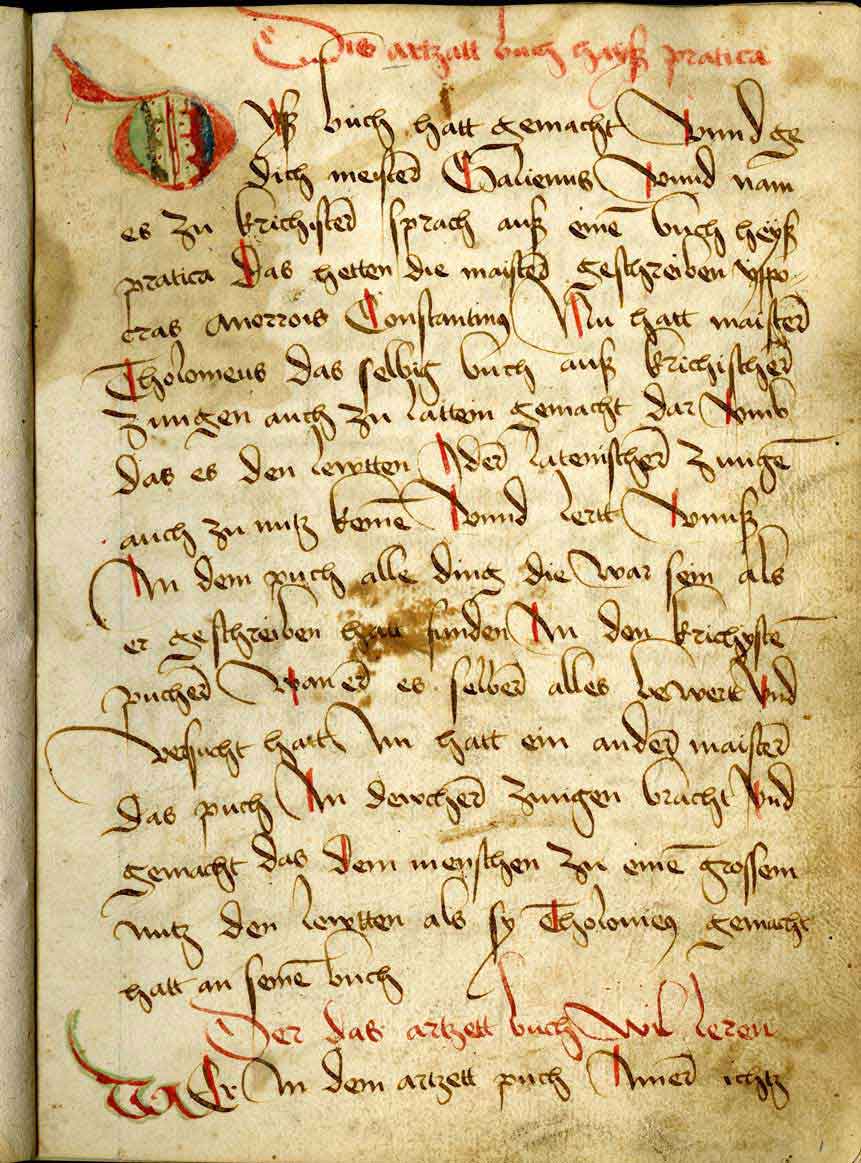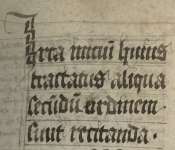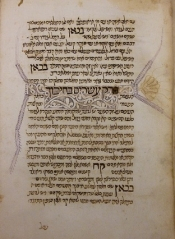 Leaf 1 recto, from Dis Artzatt Buch Gross Pratica (1489)During the Early Middle Ages, also known as the "Dark Ages" (from the fall of the Roman Empire to about 1000 A.D.), when ancient Greco-Roman knowledge and culture was neglected and nearly forgotten in Europe, the Arabs preserved and built upon the scholarship of the great medical writers of the classical world, such as Galen (129-199 AD) and Hippocrates (c. 460-370 BC). Greek culture still flourished in the Near East when the Arabs migrated to the area from Syria in the 7th century. Later they took Greek medical texts into Persia and other parts of the Middle East, translating them first into Syriac, and then into Arabic.
Leaf 1 recto, from Dis Artzatt Buch Gross Pratica (1489)During the Early Middle Ages, also known as the "Dark Ages" (from the fall of the Roman Empire to about 1000 A.D.), when ancient Greco-Roman knowledge and culture was neglected and nearly forgotten in Europe, the Arabs preserved and built upon the scholarship of the great medical writers of the classical world, such as Galen (129-199 AD) and Hippocrates (c. 460-370 BC). Greek culture still flourished in the Near East when the Arabs migrated to the area from Syria in the 7th century. Later they took Greek medical texts into Persia and other parts of the Middle East, translating them first into Syriac, and then into Arabic.  Beginning of the fourth treatise within Medical MiscellanySoon the Arabs were building on this classical tradition, producing important original contributions to medical advancement by figures such as al-Razi (ca. 860-ca. 930 AD) and Ibn Sina (980-1037 AD), known in the West as Rhazes and Avicenna respectively. During the reawakening of Europe in the Late Middle Ages and early Renaissance, ancient classical and medieval Arabic medicine was brought to Europe and translated into Latin. The writings of Galen, Hippocrates, Rhazes, Avicenna and other greats from these traditions remained authoritative in medicine well into the Early Modern period.
Beginning of the fourth treatise within Medical MiscellanySoon the Arabs were building on this classical tradition, producing important original contributions to medical advancement by figures such as al-Razi (ca. 860-ca. 930 AD) and Ibn Sina (980-1037 AD), known in the West as Rhazes and Avicenna respectively. During the reawakening of Europe in the Late Middle Ages and early Renaissance, ancient classical and medieval Arabic medicine was brought to Europe and translated into Latin. The writings of Galen, Hippocrates, Rhazes, Avicenna and other greats from these traditions remained authoritative in medicine well into the Early Modern period.
 Illuminated page from the Ninth Book of the Al-MansuriSeveral of the manuscripts in the Reynolds-Finley collection are translations of these writers’ works. For example, the German manuscript, Dis Artzatt Buch Gross Pratica (1489), though written down by Bernhardus Dieterich, is ascribed to Galen in the opening paragraph, and Bernhardus also names both the Arabic and Latin translators. The medical treatises that comprise Medical Miscellany include selections by Galen, Hippocrates, Avicenna and Mesue (Ibn Masawaih). The presence of both classical and Arab authors in this volume reflects the transfer of these traditions together into Europe. Also included in the collection is a Portuguese Hebrew manuscript of Rhazes, Ninth Book of the Al-Mansuri, translated into Hebrew from Latin by Jewish physician Tobiel ben Samuel de Leiria in 1388, illustrating the role of Jewish scholarship in the transfer of Arabic medicine.
Illuminated page from the Ninth Book of the Al-MansuriSeveral of the manuscripts in the Reynolds-Finley collection are translations of these writers’ works. For example, the German manuscript, Dis Artzatt Buch Gross Pratica (1489), though written down by Bernhardus Dieterich, is ascribed to Galen in the opening paragraph, and Bernhardus also names both the Arabic and Latin translators. The medical treatises that comprise Medical Miscellany include selections by Galen, Hippocrates, Avicenna and Mesue (Ibn Masawaih). The presence of both classical and Arab authors in this volume reflects the transfer of these traditions together into Europe. Also included in the collection is a Portuguese Hebrew manuscript of Rhazes, Ninth Book of the Al-Mansuri, translated into Hebrew from Latin by Jewish physician Tobiel ben Samuel de Leiria in 1388, illustrating the role of Jewish scholarship in the transfer of Arabic medicine.
